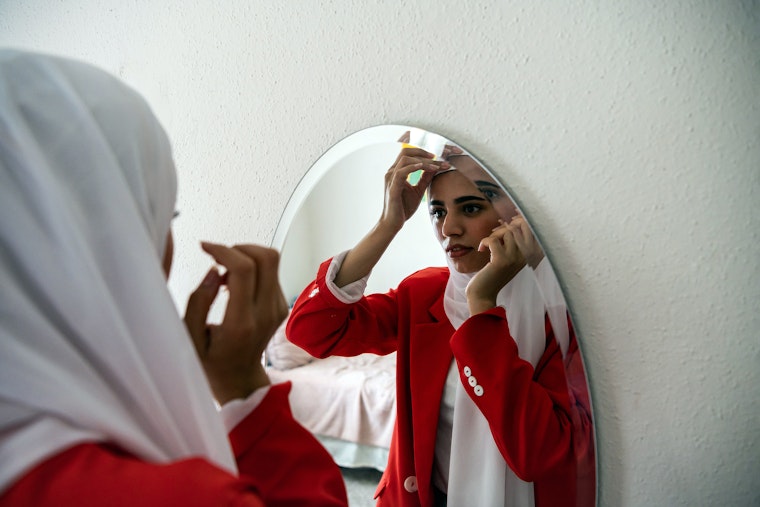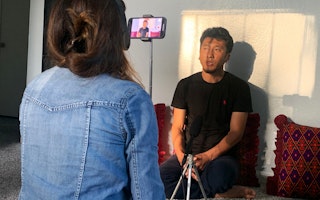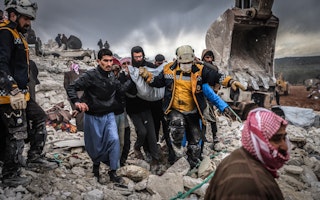“Cry, Scream, But Be Strong”: Stories of Afghans in Exile
By Gaisu Yari

It is August 15. A day that, in 2021, the people of Afghanistan did not expect to see again. Two years on from the fall of Kabul to the Taliban, we are reminded of all that we have lost. While those living in exile struggle to learn new ways to survive as refugees, Afghans still living under Taliban control—especially women—are slowly being erased from public life.
Democracy and women’s rights have all but vanished from my country. Afghanistan is now a black hole for women. Since August 2021, the Taliban has issued over 60 decrees banning women from all aspects of public life, including education, work, travel, and sports, and banishing their freedom of speech.
After the collapse of Afghanistan, I needed to understand where my fellow, fortunate Afghans had fled to and how we had the capacity to survive. Carrying our trauma, guilt, and sense of hopelessness about the future, how would we be able to move forward? I knocked on hundreds of doors around the world to connect with others in exile in an attempt to find meaning.
Two years and over 200 collected stories later, the Afghan Voices of Hope project seeks to inspire courage, especially among young women hoping to continue their education abroad and return to Afghanistan one day, and to build a community among the diaspora living in exile.
These stories of women who were forced to leave their homes represent the reality of our shared experience and touch on themes of loss, guilt, and overcoming adversity. They left their lives behind and found it incredibly difficult to relate to their new communities abroad. When asked about the moment they decided to leave, they expressed severe guilt over the women who were left behind. They yearned for their belongings, some immaterial but central to shaping their identity.
Yagana, an author and activist, told me: “That night, I slept at the airport and, in the morning, the plane arrived. People cannot understand, nor can I explain my feelings. By taking that flight I left behind 20 years of work experience.”
Sometimes the weight of her decision to leave—her only option—becomes insufferable for Fatima, who spent her whole life honing her craft as a talented theater performer and now lives in France. She asked: “What do I do now when things get unbearable, talk to a photo? It won't fix anything. The Taliban took everything from me. First, my mother. Now, my father and sister. Sometimes I wonder what is the hope for which I should keep living. What can I have, a family, a life? What?”
These women’s stories reveal the often overlooked emotional toll of displacement as refugees are uprooted from their homes, relationships and careers. They challenge us to consider the devastating impact of leaving behind not only physical possessions, but also a sense of belonging, of cultural heritage and personal dreams. They serve as a reminder of the resilience and determination required to rebuild one’s life in a new land, while highlighting the need for compassion for those who have undergone such experiences.
The stories our project has gathered also represent what it means to fight for hope and discover light in the darkness in the moments of uncertainty and our unknown future. Fatima, despite losing her family, stood strong: “Always have hope. No matter what happens, no matter how many obstacles you must face, have faith and hope. Difficulties will always arise, but you must rise to the occasion.”
Tahera, a women’s rights activist now residing in the US, agreed: “While there is life, there is hope. One should never lose hope. For us, hope is everything.”
And if nurtured, hope can become a seed of resistance, of movement, of change. As Maryam put it: “Cry, scream, but be strong. Do not let the names of Afghan women remain hidden under a veil. Fight, stand together and move together, because Afghan women can.”
These testimonies are examples of the hundreds of thousands of women around the world who are fighting for women’s rights in Afghanistan to secure a brighter future for the next generation.
Seena, a doctor now living in Poland, had this advice for the younger generation living and studying abroad: “Wherever you are, get an education and make yourself strong. Become an asset and serve the country because the Taliban cannot remain forever. Then we should all go back to our country and families. We should live happy lives. This is my dream to go back to my country, to a country full of happiness.”
These stories of strong women not only offer a glimmer of hope to improve our lives in exile, but inspire the fight to help build a new peaceful and democratic Afghanistan.
Afghan Voices of Hope is a grantee of the Open Society Foundations. Discover more inspiring stories by visiting their traveling exhibition, launching at the Global Friends of Afghanistan’s conference at the Military Women’s Memorial in Arlington, VA 1 – 3 October 2023.
Gaisu Yari is project director of Afghan Voices of Hope.

